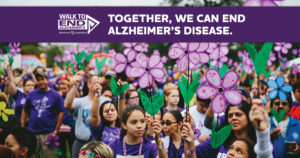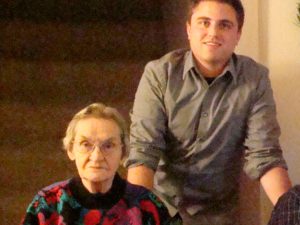 Walk to End ALZ
Walk to End ALZ
Alzheimer’s not only affects the patients, but their family and friends too. As some of you may know, Dr. Jorgenson lost his grandmother to Alzheimer’s several years back. By the end of her life, the only family members she could recognize was her husband and a daughter. She required daily assisted living to perform even basic life functions, but did remember how to play the piano! Our mission is to help the Alzheimer’s Association find a cure so that no one else has to suffer.
That’s why we’re asking you to join us this Saturday, October 7th for the annual Orange County Walk to End Alzheimer’s at Bolsa State Beach in Huntington Beach, CA.
About Alzheimer’s

Alzheimer’s disease is the most common form of dementia and affects a person’s memory, thinking abilities, and behaviors. It can start early, but usually affects those 65 years and older and can be severely debilitating to everyday life. A person suffering from Alzheimer’s often cannot recognize family members, personal objects, familiar surroundings, or memories. The basis of the disease is thought to be the accumulation of plaques and tangles that interfere with nerve cells in the brain, but much more research is needed to understand the how and why. There is currently no treatment or cure for Alzheimer’s. Over time the condition worsens and patients usually need assistance with daily care.
Alzheimer’s Dental Care
Persons suffering from Alzheimer’s may need assistance with dental care. Here are some tips for providing daily oral care to persons with Alzheimer’s or dementia:
- Give simple instructions
- Use short words/phrases in plain language.
- Demonstrate how to brush/floss
- If the person still has the motor skills to use a toothbrush, you can instruct them how to brush by having them watch you do it. Same with flossing.
- Assist as Necessary
- Help them hold the toothbrush and make the motions.
- Use the toothbrush to gently brush teeth, gums, tongue, and roof of mouth.
- Assist with flossing or using an interdental pick.
- If the patient has dentures, ensure they are routinely cleaned with warm water and a soft toothbrush, soft sponge pick, or even wet gauze.
- Watch your fingers
- Patients might get frightened or frustrated if they are not sure what is happening to them.
- Be gentle and give breaks.
- Keep up Routine Dental Visits
- Going to the dentist to ensure there is no decay or infection of the teeth or gums can significantly reduce the risk of painful or emergency dental conditions later.
- Dr. Jeremy Jorgenson is experienced with treating Alzheimer’s patients and you can book an appointment by calling 714-424-9099 or visit www.mycostamesadentist.com.
Getting Help
If you or anyone you know is suffering from Alzheimer’s the Alzheimer’s Association can help!
- Call our 24/7 Helpline: 800.272.3900
- Locate a chapter in your community
- Use our Virtual Library
- Go to Alzheimer’s Navigator to create customized action plans and connect with local support services

